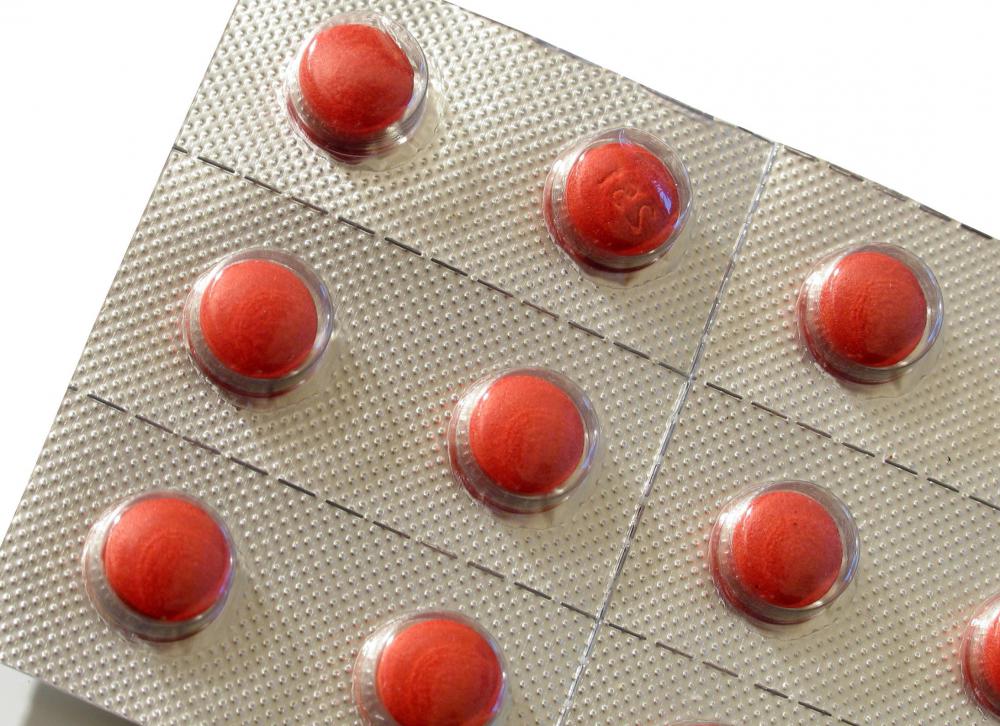At WiseGEEK, we're committed to delivering accurate, trustworthy information. Our expert-authored content is rigorously fact-checked and sourced from credible authorities. Discover how we uphold the highest standards in providing you with reliable knowledge.
What is Acetylcysteine?
Acetylcysteine, also known N-acetylcysteine or NAC, is a byproduct of N-acetyl, which is derived from cysteine, an amino acid manufactured by the human body. It is also a precursor to the synthesis of glutathione, a potent antioxidant. In medicine, this substance is formulated into an acetylcysteine solution containing a 10 or 20 percent concentration, buffered by the addition of diluted disodium edentate and hydrochloric acid or sodium hydroxide to achieve a pH of 6.0 to 7.5. Acetylcysteine is prescribed as a mucolytic, meaning that it helps to thin excess mucous in the lungs when inhaled. However, this compound is also made into oral and intravenous medications for the purpose of counteracting an overdose of acetaminophen.
The mechanism of action behind the mucolytic properties of acetylcysteine appears to reside in the sulfhydryl group of its molecular formula. In fact, it is believed that this group disrupts the disulfide chains typically found in mucus that otherwise entrap cellular waste by binding to glycoproteins. The effect of this activity is a reduction in the viscosity of mucous secretions, making them less resistant to normal flow and discharge. Since mucous viscosity is directly related to an excessive accumulation of glycoproteins and deoxyribonucleic acid (DNA), acetylcysteine is particularly effective since neither material hampers its action.

As an inhalant, acetylcysteine is helpful in treating a variety of respiratory disorders, such as bronchitis, pneumonia, tuberculosis, and emphysema. It is also sometimes administered to assist breathing in surgical patients while under anesthesia, as well as post-surgically for those who have undergone procedures involving the trachea, or windpipe. In addition, the drug may be introduced to aid in the diagnosis of respiratory diseases.

As an antidote to acetaminophen toxicity, acetylcysteine exerts a hepatoprotective effect by diminishing the impact of N-acetyl-p-benzoquinone imine (NAPQI) accumulation that may result from taking large doses of this pain reliever. Toxicity occurs because normal levels of glutathione cannot handle the NAPQI overload, which it would otherwise bind to and carry to the liver for elimination. Instead, NAPQI levels remain free and attack hepatocytes, specialized cells in the liver involved in the regulation of carbohydrates, cholesterol, and proteins. As a result, the liver may cease to function as it should. However, acetylcysteine not only promotes the binding action of glutathione, but also binds to NAPQI itself.

Not every patient is a candidate for acetylcysteine therapy, however. In fact, some asthmatics are sensitive to the drug and experience further bronchoconstriction. In addition, large or long-term doses have been known to reduce oxygen transport and increase blood pressure in the heart and lungs. This effect has been particularly noted in those who take bodybuilding dietary supplements, which often contain acetylcysteine.

Other acetylcysteine side effects include nausea, cramping, drowsiness, and unexplained fever. While there is no clear evidence that the use of this drug may impair fertility or cause birth defects in humans, caution should be exercised if the patient is or may become pregnant. Careful consideration should be made for nursing mothers as well since it is not known if this drug passes into breast milk.
AS FEATURED ON:
AS FEATURED ON:















Discuss this Article
Post your comments